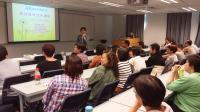Origin and Development of "Mental Health First Aid"
The concept of "Mental Health First Aid" originated in Australia. The Australian founders are two senior mental health research and education experts, Ms. Betty Kitchener and Professor Anthony Jorm. In 2001, they started to organize courses and develop related training in Australia. After that they even travelled to the rest of the world to train trainers and promote courses. The purpose of "Mental Health First Aid" is similar to that for general physiological first aid. When someone faces an outburst of mental condition but fails to get immediate professional help, a person trained in "Mental Health First Aid" skills can provide immediate assistance to maintain the safety of the person concerned as well as that of the people around. This may prevent the mental health problem to deteriorate any further, promote the rehabilitation of mental health and help relieve the pain and distress of the person concerned. The concept of "Mental Health First Aid" was introduced to this city by the Mental Health Association of Hong Kong in 2004 and has since been developed into relevant courses.
Staff Training at CUHK
To strengthen the awareness of mental health among colleagues, to help co-workers learn how to identify their own mental state and that of others and exercise appropriate intervention and support when necessary, the Staff Training and Development Section of the Personnel Office brought in the "Mental Health First Aid" course for the first time in October 2010. The standard course comprises 12 hours, colleagues who successfully complete the 12-hour course and pass a simple course-end test will be awarded the "Mental Health First Aid" certificate. In just four years since October 2010, the university has organized a total of 14 classes in "Mental Health First Aid". Altogether 237 colleagues successfully completed the course and received a certificate. When the course first arrived on campus, the main targets were teaching staff and middle management. It was later extended to other grades. Recently, the Personnel Office also launched a three-hour "Mental Health First Aid" intensive course to let more colleagues grasp the basic principles and highlights of "Mental Health First Aid".
Attendance of Front-line Staff Encouraged
Mrs. Leung Ho Siu Man, Selina, one of the course instructors (former CUHK Senior Student Counsellor and qualified "Mental Health First Aid" course instructor) pointed out that "Mental health First Aid" was of great significance to colleagues, "Mental Health First Aid is promoted through popular education. By explaining the different causes, characteristics and ways of handling for mental or emotional problems, it is hoped that participants will have the confidence to face and deal with emotionally disturbed people. At the same time, this will also minimize their fear or discrimination against the mentally disturbed. Moreover, when participants get to know more information about emotional health, they will also be concerned about their own emotional health and ultimately this will lead to a 'self-help' role."
Mrs. Leung worked in CUHK for over twenty years and has accumulated a wealth of experience especially in understanding the needs of the students and colleagues. In particular, she encouraged front-line staff in direct contact with students or parents to attend this course. Referring to student hostel workers as an example, she said: "In fact, these aunties and uncles working in hostels can act as very important bridges between the university and the students. When meeting boarders every day, they have established friendly relationship with these students. That is why it will be much easier for them to detect changes or problems in individual boarders. When there is a need, taking the initiative to show concern for the student will seem more natural. Boarders are often willing to open their heart to share with the hostel workers. If hostel workers learn more about mental health problems and remain vigilant in this area, it will be a more effective means to guard the interest of the student concerned."
Participant's sharing (1) Ms. Gloria Poon "Although their 'wounds' were not dripping with blood, the trauma they experienced might demand immediate attention."
With first aid for the "body" ─ "wound dressing", "mouth-to-mouth resuscitation" and "external cardiac massage", even though we may not know how to do it, we will not feel unfamiliar with what they are and we can understand the importance of such treatment to the injured. However, for mental health first aid, we may not even have a clue about the concept. From the "Mental Health First Aid" course, not only did I gain knowledge about mental health, but I also learnt how to assess the critical condition in mental health and how to give the mentally disturbed some basic and appropriate assistance. Although their 'wounds' were not dripping with blood, the trauma they experienced might demand immediate attention. I would like to promote this practical course to all my colleagues, in the hope that we can gain better insight into the mental health condition of the disturbed and will be able to give appropriate first aid in an emergency situation.
Ms.Gloria Poon, E.O.I, Department of Linguistics and Modern Languages, attended the "Mental Health First Aid" course on 5 June, 2013.
Participant's sharing (2) Ms. Y.K. Au Yeung "Previously, I had no idea what depression or mania was, today I finally get to know what they are."
Previously, I had no idea what depression or mania was, today I finally get to know what they are. This is a very practical course, there are even specific and careful reminders in details, such as not to look directly into the eyes, and how to stay alert and care about the students. I really learned a lot.
Ms. Y.K. Au Yeung, Postgraduate Hall office worker, attended the "Mental Health First Aid" intensive course on 18 Oct, 2014.












